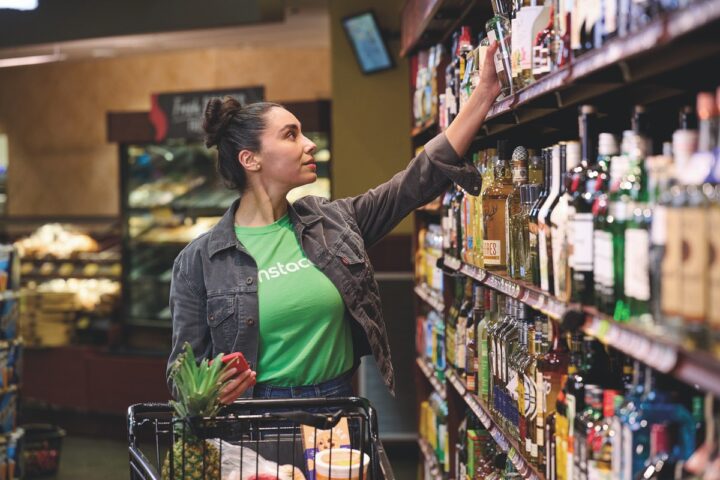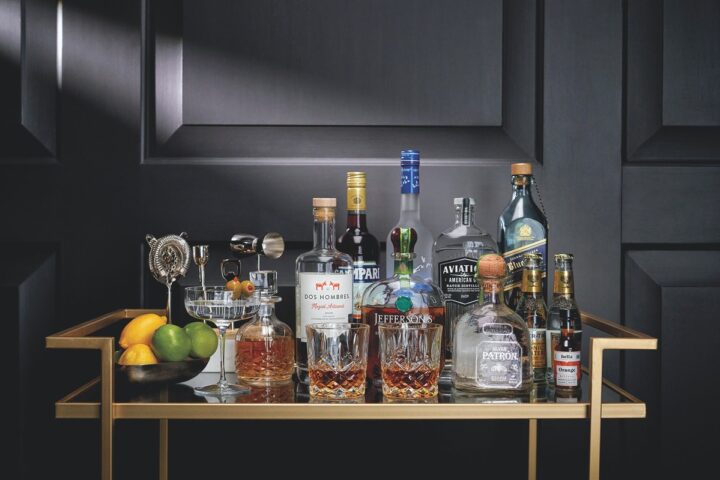
Since the start of the pandemic, beverage alcohol has been one of the fastest-growing e-commerce sectors—a development that has given rise to increased expectations from consumers for on-demand delivery of their orders. As a result, new on-demand delivery options have emerged, while established platforms are rapidly expanding and increasing their investments in the space. At Mesa Liquor in Mesa, Arizona, on-demand orders have grown to account for 10% of sales, says owner Sam Yousef, noting that any margins lost from fees to third-party delivery providers and investments in own-store delivery have been made up by increased volume sales. Mesa has been partnered with Drizly for about three years and signed on with DoorDash a few months ago. “I would consider partnering with other companies,” Yousef says. “It could further increase my overall sales.”
Indeed, in addition to consumer interest, beverage alcohol retailers are helping drive growth in the space. According to online grocery platform Instacart, baskets with beverage alcohol are typically 25% larger than those without. DoorDash reports even higher numbers, with beverage alcohol increasing restaurants’ and supermarkets’ average on-demand order values by up to 30% and convenience stores’ by more than 50%. The movement has of course been aided by legislative changes in many markets as a result of the pandemic and lockdowns that permitted beverage alcohol delivery to consumers’ homes. As a result, “we saw many of the retailers on our platform opting into adding alcohol to their menus or joining our platform for the first time,” says Caitlin Macnamara, director of alcohol strategy and operations at DoorDash. Innovative technology has also contributed, she adds. Overall, according to Drizly COO Cathy Lewenberg, between 7%-8% of off-premise beverage alcohol sales are now via e-commerce.

Investment Surge
With such dramatic growth in a short period of time, it’s small wonder that the on-demand beverage alcohol space has attracted investors—and the infusion of significant capital. Drizly’s $1.1 billion acquisition by Uber Technologies closed in October, and integration with the San Francisco-based ride-share and tech company continues, including with its UberEats subsidiary. A number of launches are planned for this year that will “enhance the alcohol experience” for both Drizly and UberEats users, Lewenberg says. But she maintains that Drizly’s independent retailers remain the platform’s core, and with that the option for merchants to choose how prod- uct delivery is carried out—by store employees or outsourced to third-party couriers—where they legally can.
The height of the pandemic brought Drizly into new markets and increased penetration in the areas it already served. In addi- tion, the platform has begun to focus on chain “enterprise” accounts, Lewenberg says, which has been “highly incremental to our core business.” Late last year, for example, Drizly teamed with 7-Eleven to enable beverage alcohol deliveries to app users in less than an hour. “7-Eleven has played a role in helping us expand our coverage, fill gaps, and reach new consumers,” says Lewenberg of the 1,500 c-store locations now involved in the partnership. She adds that 7-Eleven orders tend to over-index on beer, as compared to independent liquor stores, allowing Drizly to reach a different customer base. As of this month, Uber Direct will be 7-Eleven’s exclusive courier partner for beverage alcohol orders powered by Drizly, Lewenberg reveals.
At press time, Drizly was partnered with more than 5,500 bever- age alcohol licensees in 31 states and Washington, D.C., of which 70% are independent operators. Average order value is $65, Lewenberg says, which continues to represent a 20% increase from 2019. Noting that unlike other on-demand platforms, Drizly was “built from the ground up to ensure that we were compliant with the three tiers.” Lewenberg adds, “we believe our singular emphasis on beverage alcohol will remain the differentiator between Drizly and other providers. And with Uber’s role now, it will help us to meet the convenience and demand components of e-commerce.”
Last fall, ReserveBar acquired Minibar Delivery, an on-demand ordering platform similar to the Drizly model. “The acquisition creates an expansive combined retail footprint which will grow to over 5,000 locations by the end of the year,” says ReserveBar president Derek Correia. “The acquisition was born out of synergies generated by the complementary e-commerce segments we serve.” With the merger, Minibar will expand into limited-edition brands, gift offerings, and personalized and engraved bottles, products on which ReserveBar was built. ReserveBar customers, meanwhile, will soon be able to receive on-demand fulfillment, Correia notes, as previously the concept relied on ground shipping.

New Players
On-demand apps and delivery providers not initially established for beverage alco- hol have been getting aggressive in the space. Instacart is now partnered with more than 300 retailers, including large chain operators like Costco, Aldi, Albertson’s, Publix, Safeway, and Meijer, for same-day delivery and in-store pickup of beverage alco- hol products from 17,000 stores in 26 states and Washington, D.C. According to the plat- form, beverage alcohol is one of the most popular digital aisles on Instacart.
DoorDash, meanwhile, primarily known for on-demand orders from restaurants, has been expanding rapidly into other channels, including grocery, convenience, and liquor stores. The online marketplace now facilitates beverage alcohol delivery across 20 states and Washington, D.C. via thousands of on- and off-premise licensees. Among the retailers it’s now partnered with for beverage alcohol orders are Total Wine & More, Spec’s Wine, Spirits & Finer Foods, Meijer, and Hy-Vee. Beverage alcohol sales on DoorDash more than doubled from January to June 2021, as compared to the year-earlier period, the company says.
Vertically integrated operating models are also aggressively looking to expand their share of on-demand beverage alcohol sales. Philadelphia-based Gopuff acquired California’s BevMo chain in 2020, followed by Kentucky’s Liquor Barn last year, in efforts to leverage their physical and license infrastructures and industry expertise to accelerate growth. Unlike operators like Drizly and DoorDash, Gopuff owns its inventory, giving it the flexibility to control, localize, and update inventory quickly. In total, Gopuff operates more than 600 locations and delivers to customers in 43 states and Washington, D.C. “We listen to our customers and contin- uously analyze the robust data we have so we can make the best decisions,” says Randy Ornstein, senior director of beverages for Gopuff. For beverage alcohol, he continues, “we must optimize and localize our assortment to become customers’ go-to for new innovations.” At press time, reports swirled that Gopuff could move to go public by mid-year.
Chicago-based Foxtrot is another vertical player, which, like Gopuff, was founded as an e-commerce marketplace that has more recently moved into brick and mortar. Foxtrot operates 16 modern convenience stores in Chicago, Dallas, and Washington, D.C., with plans to open as many as two dozen more in markets like Boston, Austin, Texas, and Chicago this year, followed by expansion into new markets in 2023. According to the company, half of all sales are via its courier delivery program, with delivery service provided within a few miles radius of each store. Beverage alcohol accounts for 40% of Foxtrot’s sales.

Appealing Economics
Even long-established delivery providers are expanding in the beverage alcohol segment. FedEx SameDay City has been work- ing with beverage alcohol retailers since 2020 to provide delivery of e-commerce orders in less than four hours. “We’re seeing broad and expanded interest in same-day delivery of alcohol,” says Mike Preston, vice president of network operations at FedEx Office, of which SameDay City is an offshoot. “It’s a growing portion of our business. We expect to see continued growth in this market.” Under the service, consumers place their orders online with retail- ers and once the order is accepted, picked, and packed, a FedEx courier is dispatched to the store to pick up and deliver the order. Preston adds that shipping fees are “competitively priced,” and that retailers and consumers alike are attracted to delivery by “uniformed couriers in branded trucks from a trusted brand.” Among the retailers offering FedEx SameDay City is Goody Goody, the Texas liquor store chain, which allows for two-hour delivery windows, from 11 a.m. to 9 p.m., Monday through Saturday.
Among other leading independent liquor stores, Gary’s Wine & Marketplace offers one-hour local delivery via its own vehicles within a 5-mile radius of its New Jersey stores and a 1-mile radius of its St. Helena location. “Customer response has far exceeded our expectations,” remarks Mike Fisch, Gary’s director of innovation. He notes that the average basket size for a local delivery order is $199, while conceding that vehi- cle and labor fees pose challenges when it comes to on-demand delivery. “Due to the high average basket size, the economics of local delivery are quite appealing, especially given the demand for the service,” Fisch says.
Executives at on-demand platforms say that retailers who are not yet committed to the service are missing a big oppor- tunity. “Don’t wait another day,” advises Drizly’s Lewenberg. “It’s the way consumers are behaving across the board. They’re researching prices, inventory, and unique SKUs.” And the platforms are also driving customers into stores, she adds. “Digital platforms are playing a huge role in molding customer behavior and purchasing decisions.”
On-demand ordering and delivery of beverage alcohol isn’t going away, those involved with the programs say. Lewenberg notes that Drizly forecasts e-commerce sales of beverage alcohol to reach an 18% share in the next few years. Says FedEx’s Preston, “Everything we’re seeing is that consumers are adapting to a new normal and want and expect to be able to order items for quick delivery to their homes.”